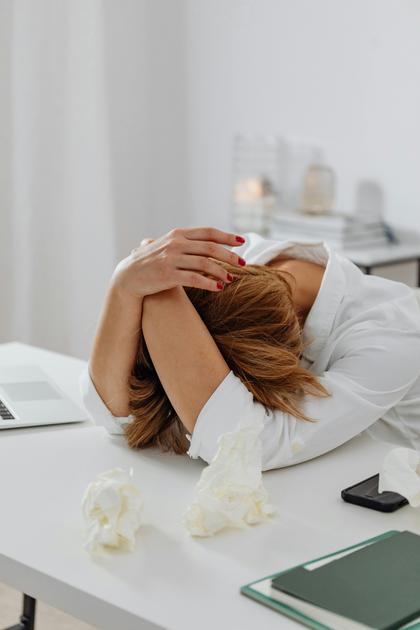Anxiety, Hormones and Sleep: Discover the Hidden Connection!
Have you ever felt that anxiety creeps in when you least expect it, often affecting your sleep? Maybe you’ve noticed that fluctuating hormones play a role in your waking hours. As women, we face unique challenges as our bodies undergo various changes. Understanding the hidden connection between anxiety, hormones, and sleep can empower us to regain control over our lives, transforming fatigue into vitality.
Understanding Anxiety: A Common Struggle
Anxiety can feel like a weighted blanket, pressing down on you when you least expect it. For many women, it’s a familiar companion, whispering worries about daily life, relationships, and responsibilities. Over 30, many women find that their mental health can fluctuate wildly due to a range of factors, including life transitions such as motherhood, career changes, or aging. This emotional landscape can often feel overwhelming.
What makes anxiety particularly troubling is its ability to manifest physically. You might experience rapid heartbeats, sweating, or stomachaches that make you feel even more anxious. This is because anxiety doesn’t just exist in our minds; it has a profound impact on our bodies too. Recognizing that you are not alone in this struggle can be the first step toward finding peace.
The Role of Hormones in Women’s Health
Hormones are like delicate strings in a symphony, each playing a critical role in our overall health. For women, hormonal fluctuations can be particularly pronounced throughout the menstrual cycle. Estrogen, progesterone, and other hormones can fluctuate, influencing not just physical health but also mental well-being. It’s fascinating yet frustrating how these tiny molecules can wield such power over our mood, energy levels, and much more.
During certain phases of the cycle, hormonal levels may dip, leading to increased feelings of anxiety or irritability. You might find yourself more overwhelmed by stress, especially in the days leading up to your period. Understanding this connection can help demystify your experiences and empower you to embrace your body’s natural rhythms.
How Sleep Impacts Your Mental Wellbeing
Sleep and mental health go hand in hand, especially for women trying to balance multiple roles. When you don’t get enough sleep, it can feel like you’re stuck in a fog. Sleep deprivation can worsen anxiety and make it more challenging to manage daily stressors. The struggle to fall or stay asleep may feel like an endless cycle.
When hormonal changes disrupt your sleep patterns, it’s likely that feelings of anxiety will creep in. You might lie awake at night, mind racing with thoughts, leading to increased fatigue the next day. Prioritizing quality sleep is more crucial than ever; it’s not just about productivity—it’s about mental clarity and emotional balance.
Recognizing the Signs of Hormonal Imbalance
Sometimes, your feelings of anxiety might be cues from your body that something isn’t quite right. Recognizing the signs of hormonal imbalance can help you feel empowered to make necessary changes. Symptoms may include unpredictable mood swings, weight fluctuations, fatigue, or irregular periods.
If you find that your anxiety levels align with these symptoms, it might be worth exploring hormonal health. Knowledge is power; understanding what’s happening in your body can lead you toward solutions that help alleviate symptoms. You deserve to feel balanced!
The Anxiety-Sleep Cycle: Breaking the Pattern
The anxiety-sleep cycle can feel like a never-ending loop. You feel anxious about something, you can’t sleep, and then the next day, you’re even more anxious and exhausted. Breaking this cycle takes conscious effort, but know it’s entirely possible. You’re not alone in this!
One effective strategy is to identify and change the triggers that promote anxiety before bedtime. Simple adjustments like setting a consistent sleep schedule, limiting screen time, and creating a serene sleeping environment can all help. Remember, each small change contributes to breaking free from this cycle.
Natural Remedies for Hormonal Harmony
Alternative approaches can be beneficial if you’re feeling the weight of hormonal imbalance. Natural remedies such as herbs, essential oils, and dietary changes can support hormonal harmony and overall well-being. Supplements like magnesium or B vitamins may also provide relief.
- Herbal Teas: Teas like chamomile and lavender can soothe anxiety and promote relaxation.
- Essential Oils: Scents like eucalyptus or rosemary can brighten your mood and help with relaxation.
- Balanced Diet: A diet rich in whole foods—fruits, vegetables, grains, and lean proteins—can influence hormonal balance.
Incorporating these natural remedies into your routine can be a gentle approach to improving your emotional and physical health.
The Importance of Self-Care and Rest
Self-care isn’t just a trendy phrase; it’s a vital part of mental health for women dealing with anxiety and hormonal imbalances. Carving out time for relaxation and activities that nurture your soul can provide a refreshing break from the daily grind. Find what works best for you—whether it’s enjoying a warm bath, practicing yoga, or simply reading a good book. Remember, prioritizing yourself is not selfish; it’s necessary.
Also, consider the power of rest. Allow yourself to take breaks throughout the day. Even short moments of quiet can rejuvenate your spirit and soothe anxious thoughts.
Connecting with Supportive Communities
Finding a supportive community can create a safe space where you feel understood and validated. Whether it’s through online forums, local groups, or social media, connecting with women who share similar experiences can be incredibly empowering. You’re not alone in this journey.
Sharing feelings and insights can lighten the weight you carry. It’s amazing how voicing your concerns can dissolve the isolation and pave the way for healing. Remember that solidarity is essential; as you support each other, you can thrive together.
How to Create a Calming Sleep Routine
A calming nighttime routine can significantly improve your sleep quality. Start by establishing a relaxing pre-sleep ritual, which sends signals to your body that it’s time to wind down. This could include:
- Dim the Lights: Lowering the lights can help signal to your body that it’s time to sleep.
- Limit Screen Time: Avoid screens for at least an hour before bed. Opt for a good book instead.
- Relaxation Techniques: Incorporating deep breathing or meditation can help calm your mind.
- Comfortable Environment: Ensure your sleeping space is cozy and conducive to rest.
Consistency is key! Design a routine that feels good and encourages your body to honor its need for rest.
Empowerment Through Knowledge: Your Path Forward
As you navigate anxiety, hormones, and sleep, know that understanding these connections can lead to empowerment. You have the right to seek solutions, prioritize your well-being, and reclaim the harmony in your life.
By following a simple, step-by-step approach, just as many women have done, you can experience significant improvements in your life. Embrace this journey toward balance and whisper to yourself—you are strong, you are capable, and you are deserving of peace. Discover this solution, and take the first step today!













